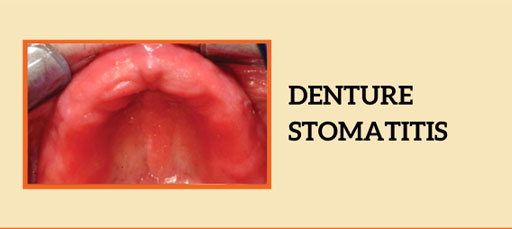
Denture Stomatitis – Symptoms, Causes, Treatment
Denture Stomatitis, also known as Denture sore mouth or Denture inflammation is a prevalent condition that affects a substantial portion of denture wearers. This condition manifests as inflammation and irritation of the oral mucosa, specifically underneath the denture base. While it might sound alarming, understanding its symptoms, causes, and treatment can significantly alleviate its impact on oral health.
Denture Stomatitis Symptoms
Recognizing denture stomatitis primarily involves paying attention to subtle yet significant changes in oral health. Some common symptoms include:
- Redness: The tissues covered by the denture appear reddened and irritated.
- Swelling: Inflammation of the gums and mucosal tissues underneath the denture.
- Discomfort: Patients may experience varying degrees of discomfort, ranging from mild irritation to soreness.
- Burning Sensation: Some individuals report a burning or tingling sensation in the affected area.
- Difficulty in Wearing Dentures: Discomfort or pain might make it challenging to wear dentures comfortably.
Denture Stomatitis Causes
Several factors contribute to the development of denture stomatitis:
- Poor Denture Hygiene: Inadequate cleaning of dentures leads to the accumulation of plaque, bacteria, and fungi, creating an environment conducive to infection.
- Yeast Overgrowth: Candida albicans, a type of yeast, is often responsible for causing stomatitis. Its overgrowth is facilitated by factors like compromised immune systems, diabetes, or certain medications.
- Denture Fit: Ill-fitting dentures can cause constant friction and pressure on the oral tissues, leading to inflammation and subsequent stomatitis.
Denture Stomatitis Treatment
Addressing denture stomatitis involves a multi-faceted approach aimed at alleviating symptoms and preventing recurrence:
- Improved Oral Hygiene: Thoroughly cleaning dentures using appropriate cleansers helps remove debris and microbes. Soaking dentures in antifungal solutions as recommended by a dentist is also beneficial.
- Medication: Topical antifungal agents, such as nystatin or clotrimazole, are commonly prescribed to manage candidiasis. In severe cases, systemic antifungal medications may be necessary.
- Denture Adjustment: Ensuring proper denture fit is crucial. Dentists may need to adjust or replace ill-fitting dentures to alleviate pressure on the affected tissues.
- Regular Dental Check-ups: Routine visits to the dentist are essential for monitoring oral health and addressing any potential issues promptly.
Prevention
Preventing denture stomatitis primarily involves adopting good oral hygiene practices:
- Proper Denture Care: Thoroughly clean dentures daily to prevent the accumulation of microbes. Soaking dentures in antifungal solutions regularly is advisable.
- Oral Hygiene: Brushing gums, tongue, and palate using a soft-bristled brush can help remove bacteria and prevent infection.
- Regular Dental Visits: Scheduled dental check-ups ensure early detection and management of any oral health concerns.
Conclusion
Denture stomatitis is a common yet manageable condition that requires attention and proper oral care. By prioritizing oral hygiene, seeking timely dental care, and addressing ill-fitting dentures, individuals can significantly reduce the risk and impact of this oral condition. Remember, a healthy smile begins with proactive oral health habits and regular visits to your dentist. Visit your Nearby Dental Clinic Today.
Leave a Reply
Leave a Reply
Explore More Similar Posts
Explore More Blogs


Leave a Reply